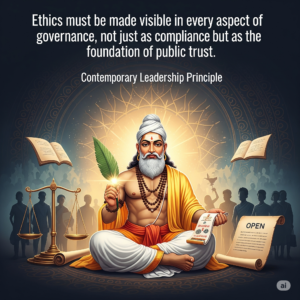GS PAPER 1 -UNIT -3-TOPIC -Ethics & Philosophy
“Ethics must be made visible in every aspect of governance, not just as compliance but as the foundation of public trust.”** – Contemporary Leadership Principle
- Understanding Good Governance Framework
Defining Good Governance:
- Good governance refers to processes whereby public institutions conduct public affairs, manage public resources, and guarantee realization of human rights
- Core components include transparency in decision-making with accessible information, responsiveness to all stakeholders within reasonable timeframes, and effectiveness in institutional processes
- Encompasses participation, rule of law, consensus orientation, equity, and accountability as fundamental pillars
Administrative Efficiency vs. Ethical Foundation:
- Efficient administration ensures timely service delivery and optimal resource utilization through streamlined processes
- However, efficiency without ethics can lead to procedural compliance without genuine public welfare commitment
- Ethical foundation provides moral compass for administrative decisions, ensuring long-term legitimacy and citizen trust
- Role of Ethics in Administrative Decision-Making
Ethical Leadership Qualities in Contemporary Context:
- Integrity in decision-making processes, ensuring consistency between stated values and actual actions taken by public officials
- Moral courage to take difficult decisions that serve public interest over personal or political gains
- Empathy and inclusiveness in policy formulation, considering diverse stakeholder perspectives and marginalized community needs
- “Leadership is not about being in charge, but taking care of those in your charge” – Simon Sinek’s principle applied to public administration
Ethics-Administration Integration:
- Value-based decision-making frameworks that prioritize public welfare over bureaucratic convenience or political expediency
- Ethical reasoning in policy formulation ensures long-term sustainability and social justice considerations
- Professional integrity maintains citizen confidence in governmental institutions and democratic processes
III. Contemporary Challenges in Governance
Corruption and Accountability Crisis:
- India’s 2024 Corruption Perceptions Index score of 38 out of 100 and rank of 96th among 180 countries reflects persistent corruption challenges
- Systemic corruption undermines efficient service delivery and erodes public trust in governmental institutions
- Accountability mechanisms remain weak despite legal frameworks, creating gaps between policy intentions and implementation outcomes
Transparency and Digital Governance:
- RTI Act 2005 enables citizens to access government information, promoting accountability and transparency in decision-making processes
- Digital governance initiatives face challenges in ensuring inclusive access while maintaining transparency standards
- Information asymmetries between administrators and citizens create opportunities for discretionary misuse
- Promoting Ethical Governance Mechanisms
Technological Solutions and Reforms:
- Emerging technologies like AI and blockchain enhance efficiency and reduce corruption in service delivery systems
- Digital platforms create audit trails and reduce human discretion in service delivery processes
- Strengthening local governance through empowered Panchayati Raj Institutions with greater financial autonomy
Institutional Strengthening Measures:
- Ethics training programs for civil servants focusing on value-based leadership and moral decision-making frameworks
- Independent oversight mechanisms including ombudsman institutions and citizen grievance redressal systems
- Performance evaluation systems that include ethical conduct assessments alongside efficiency parameters
Case Study Application: Recent initiatives in digital governance demonstrate how technology can enhance both efficiency and ethics. However, success requires continuous monitoring, citizen participation, and leadership commitment to ethical principles rather than mere technological adoption.
- Assessment and Way Forward
Balanced Approach Necessity: Contemporary governance requires synergistic combination of administrative efficiency and ethical leadership. Neither element alone suffices for sustainable good governance. Efficient systems without ethical foundation may achieve short-term results but fail to build long-term legitimacy and citizen trust essential for democratic governance.
Future Directions:
- Values-based leadership promotion in public service requires systematic institutional reforms
- Continuous capacity building, citizen engagement, and accountability mechanisms ensure ethical governance sustainability
- Integration of efficiency metrics with ethical performance indicators creates comprehensive governance assessment frameworks
“Good governance is not about perfect administration, but about continuously striving to serve citizens with integrity, transparency, and unwavering commitment to public welfare.” – Contemporary Governance Philosophy

